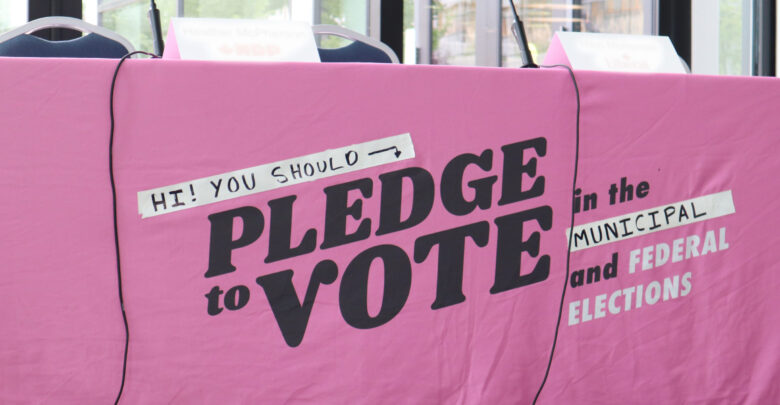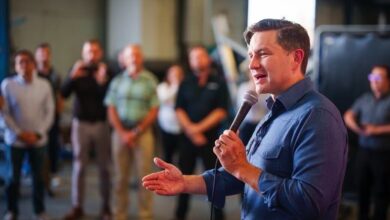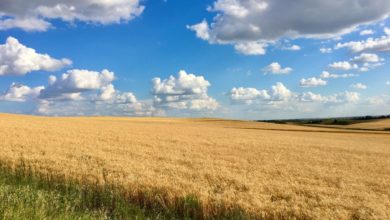 Mitchell Pawluk
Mitchell PawlukOn October 18, Edmontonians have an important decision to make when they cast their ballots. However, the important of this decision is elevated even further for post-secondary students, many of whom are voting for their first time.
The next mayor of Edmonton will likely still be around as we graduate, look for jobs, and find places to live in Edmonton — or even leave the city for good. In many ways, our future is in their hands. So, determining who is best for the job is no small task.
Mayoral candidates attended many forums over the past couple months, including two that were hosted by student leaders; first, the Edmonton Student Alliance hosted a forum at MacEwan University and the University of Alberta Sustainability Council hosted their own forum that was specifically a debate on climate.
As the campaign comes to an end, let’s look at how each of the remaining candidates did.
Amarjeet Sohi
Sohi’s strength is in his story. Out of all the candidates, he comes across as the most sincere when it comes to professing his love of Edmonton. I’d be lying if I said his first campaign video didn’t make me want to cry a little. He has a charisma and a warmth that I think really appeals to what people look for in a mayor.
Sohi sets himself apart as a strong advocate for transit and he highlighted this especially at the EPL forum.
“I’m the only candidate who has unwavering commitment to get the West LRT finished to southwest and finally get it to Castledowns,” he said.
He is also a strong voice for fighting climate change on the municipal level especially, as he demonstrated at the climate debate.
“We are facing a climate crisis and leadership is necessary,” he said. He said the biggest challenge for Edmonton is learning to become a leader in energy transition but that we have an opportunity right now. “Edmonton can be a major hub for renewable energy production and energy adaptation,” he said. “We cannot let it slip by.”
He said that in order to help retain youth in our city, we need to create economic opportunities and decarbonize — but that young educated people can also play a role. “This is where you come in,” he said.
Sohi’s strength however, was at times also a weakness. In providing grand visions of our city and touching answers, he also avoided giving detailed answers to some questions. For example, Sohi promises to end hate-based violence in our city, which is definitely important. However, these promises do little to dive into specifics, such as how he would address existing issues within bylaws or what these specific issues currently are. Overall, I was left wanting to hear more about his proposed policies.
Michael Oshry
Oshry is a former city councillor and prominent business person in Edmonton. What stood out to me about Oshry was that he had a strong debate performance, being one of the few candidates to make quips directed at others.
At the EPL forum, Oshry called out Nickel for making threats about Epcor’s board. Oshry said that the city must work with Epcor on “flood mitigation and climate change adaptation.” He added that the company generates a fair amount of the city’s revenue. “If Mike Nickel decides to kill Epcor, all of our taxes are going to go up by about 10 per cent,” he said.
Another strength of Oshry’s at the debates was that he brought up specific plans that stood out from the others. At the climate debate, he talked about the Clean Energy Improvement Program (CEIP). Oshry also wants to replace every city bus that retires with an electric one.
Additionally, he is a “big supporter of urban reserves,” and has a vision for doing this in conjunction with developing West Rossdale. His plan involves “partnering with Chief Moran, the Indigenous community, private sector, and government to have a meeting place down by the river with outdoor cafes and markets and restaurants in the power plant and outside.”
Oshry loves getting into the specifics, is skilled in debate, and is talented at thinking of good lines against other candidates — but that isn’t always the best way to go about municipal politics. Watching his assertive performance at forums, I couldn’t help but worry that Oshry may want to win more than he wants to work with others. His mindset is well-suited for business but doesn’t necessarily reflect the consensus-building skills I want to see in a future mayor.
Cheryll Watson
Watson is another candidate sourced from the business sector. She comes across as well-prepared and like she has done her research. As a candidate without council experience, she seems in touch with the needs of Edmonton and how civic politics works. She was the first candidate to announce her run for mayor and has since run a relatively strong campaign.
Watson wants to bring her affinity for business to help address “brain drain” through extensive internships and co-op programs for students — inspired by cities that have “brain gain.” She says the city needs to help provide these opportunities “so that [students] actually see opportunity in this city.”
As a candidate that has no council experience and not much name recognition, Watson was an underdog from the start. That being said, Watson made a major blunder by calling for a pause of the Valley Line West LRT late in the game. Watson says the city needs to reassess its worth, but I don’t think this was a popular move or one that is realistic as the project is already well underway.
Diana Steele
Steele is the president of Crestwood Community League and can be described as an approachable leader. At the MacEwan forum, she highlighted her commitment to accessibility.
“I don’t have a headquarters because I make the effort to travel to see every single person who wants to meet with me. I will never make you come to me,” she said.
Steele however, can also seem out of touch at times. Her answers are not rooted in concrete policy and often miss the mark. An example is at the climate forum, where she said citizens need to be offered more incentives for making changes in their own lives and for council members to lead by example.
“I myself do what I can in my personal life to reduce my carbon footprint,” said Steele. “I’ve ordered a Tesla. I run my campaign in an eco-friendly way; there are no signs.”
While it’s great that Steele is able to afford an electric vehicle, this comment felt tone-deaf. I also want more from a mayor than just incentives for personal action and I felt this remark came at the expense of concrete citywide policies that would ultimately have more impact.
Kim Krushell
Krushell is a former city councillor and involved in the tech industry with two companies of her own. Her focus on tech and innovation certainly goes further than the other candidates and she seems very familiar with the ins and outs of civic politics despite being away from city hall for eight years.
Overall, however, I’ve been let down by Krushell’s performance at the forums. At the climate forum, for example, Krushell said that while she has commitments to climate change in the core pillars of her platform, her full climate change commitment would be released the following week. It struck me as odd that Krushell would show up to a debate specifically on climate, without having these commitments already worked out and released.
I would love to see a woman in the mayor’s seat in Edmonton and Krushell initially seemed like the most likely candidate for the job. Her campaign however, has been disappointing and I feel like her ideas for bold action are sometimes misplaced.
Brian “Breezy” Gregg
Gregg is by far the most entertaining candidate of the bunch: he sings, strums his guitar, and cracks jokes all while proposing some unique and radical ideas for Edmonton’s future.
His idea for social service hubs for example, is really interesting to me and he is the only mayoral candidate calling for free transit. His focus on things like autonomous vehicles however, seem a little far fetched to me. While those are an interesting long term project, we need to look at the issues of our transit system in the immediate future.
At an earlier Rat Creek Press forum, Gregg expressed his view that the solution to racism is not to fight it, but to teach people to love and respect others. “I’m sick of hearing people talking about fighting [racism] and anti-racism,” he said.
“Let’s talk about love, love and respect for everyone.”
While I admire Greggs focus on positivity, I felt like this response is not pertinent to the current political moment. Peace and love are not enough and a mayor has to have a strong voice in the event of racist attacks — which have been on the rise, especially against Muslim women.
Mike Nickel
Nickel will likely be the second place candidate in this race as he remains popular with conservatives and developers. It is safe to say that Nickel is the low-tax candidate as he is proposing a 10 per cent tax cut over four years.
While he attended fewer forums than other candidates, he made some memorable remarks about his plans for the city. Nickel is a populist leader with a line for everything. He calls Edmonton’s bike lane expansion network a “war on cars” for example.
“We cannot tax our way out of climate change,” he says, adding that we must instead focus on common sense solutions like better insulating our buildings.
Nickel pointed out that the other candidates are overly focused on tech, adding that “this is a blue collar town, we need blue collar jobs.”
While I don’t think I would call Edmonton a blue collar town, Nickel does have a point here in that tech and innovation are the answer to everything for some of these candidates — which doesn’t speak to all Edmontonians.
Nickel is a good salesman who can make extremely complicated topics seem very simple. At the end of the day, however, these are still complicated topics, whose solutions must go further in-depth. For example, Nickel can propose ending the “war on cars” but there still is a growing need for environmentally-friendly, affordable transportation in Edmonton that requires more substantive policies than is offered in Nickel’s platform.
While Rick Comrie and Abdul Malik Chukwudi will be on the ballot, they have both dropped out of the race and since made endorsements for Mike Nickel.
Election day is October 18 and polls will be open from 9 a.m. to 8 p.m..




